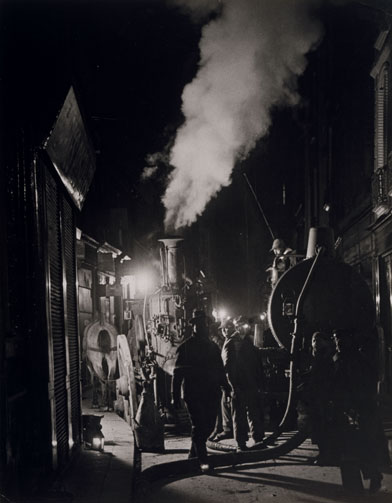Fr : version française / En: english version
It's a dirty job...
The slurry from cities had long been used to fertilize the fields used to feed the people. Until the sewer systems were finished, slurry removal was a vital concern that figured among the priorities of any incumbent government.
The Vengeance of King Gontran
"Therefore, as you say, this man had two fathers at the same time, one a worker in wool, the other a miller. Fie on you, king, to say such an outlandish thing. For it is an unheard of thing that one man should have two fathers at the same time except in a spiritual sense." Then they laughed without restraint and another legate said: "We bid you good-by, O king. Although you have refused to restore your nephew's cities we know that the ax is still safe that was driven into your brothers' heads. It will soon strike yours." Thus they went off in a quarrelsome spirit. Then the king, inflamed at their insults, ordered his men to throw on their heads as they went rotted horse-dung, chips, hay and straw covered with filth, and the stinking refuse from the city. And they were badly fouled and went off amid unmeasured insult and abuse.
Extract from "History of the Franks" by Gregory of Tours, 6th century, translated by Ernest Brehaut
A wide range of edicts, regulations and contracts were drawn up in an attempt to address the matter, without ever doing so successfully.
Refuse collectors
They remove the refuse that the domestic broom pushes into a corner; the broom is however limp and insufficient, and the collectors scour the city. It requires quick feet to nimbly slip between their shovel and cart. Should you take too long or falter in your stride, the refuse collector's shovel empties in your pocket. The cart carries a blackish slurry, which undulates in a frightening manner; should things get out of hand, then the half-open cart is quick to share in detail all that it has received wholesale. Shovel, broom, man, cart and horse are all the same color, as if they all seek to stamp the same color on each passer-by...
Moral putridity goes hand in hand, so to speak, with the infection of the gutter. Oh, if only the refuse collector's shovel could lift into that same cart all those filthy souls who infest society and carry them out beyond the city walls, what a wonderful thing that would be, and what precious help to the police...!
Those bourgeois citizens asked to sweep their doorstep either fail to do so or do so only slackly. The police had set up the refuse collectors, with the responsibility of requesting a small contribution from each household: but the bourgeois, who fears the tiniest of taxes—because he knows from experience that such levies only grow and gain frills—refuses to pay. We will likely have to wait until these recalcitrant folk are up to their necks in filth before they cry for mercy. Only then will they submit to the good graces of the refuse collection system, something I cannot help but deem necessary.
Extract from Louis-Sébastien Mercier's "Tableaux de Paris", 1783. (Free translation from the French)
750 cubic meters of waste were collected every day in Paris in the year 1780. The use of cess pools was made mandatory in 1539 and although the law required all Parisian property owners to connect their homes to the sewer system in 1894, this photograph shows that even by the 1930s, the city was still relying on its cesspit emptiers!
Street sweepers, an early morning in the 20s...
Day dawned on the avenue while the ragpickers assigned to this section of road were skillfully rummaging through the last trashcans with their hooks. Then the municipal street sweepers passed through, brushing the cobblestones under streams of water. Next it was the turn of the dust carts to appear, avid for the rubbish that the garbage collectors cram into the trashcans, with no qualms about clanking the trashcans, bringing out the concierges with their clatter to fetch their bins, and causing the upstairs maids to fold back the shutters.
Extract from Hotu soit qui mal y pense, chapter IV, by Albert Simonin, ed. Série Noire, Gallimard.



























